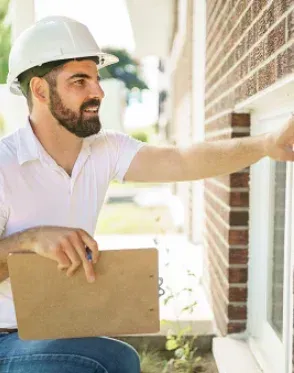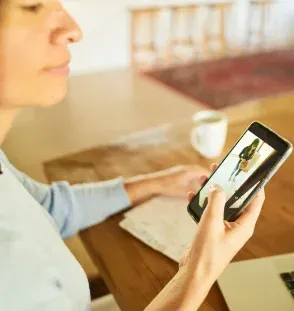Making your space more secure … locks, lights and vigilance
There’s no place like home. The place where you feel comfortable and safe. Sometimes you feel safe just because it’s your home. Or because of how long you’ve lived there. Or because of the familiar neighborhood.
Even if you don’t have any safety concerns, it’s a good idea not to get complacent about home security.
In the U.S., a home burglary happens roughly every 20 seconds and usually lasts 8 to 10 minutes. Your average burglar doesn’t want to find anyone home: More than 50% of break-ins happen between 9 a.m. and 3 p.m.
There are many things you can do to make your abode more secure. The more difficult and time-consuming it is to try to get into your place, the greater the odds the burglar will cut bait and move on to an easier target.
Let’s take a look at some basic ways to protect your home. These tips may require a little more research on your end, but they’re a place to start.
Do a home security inspection.
Walk around the inside and outside of your home to see if it’s as secure as it could be. Have the shrubs near your windows had a growth spurt? Is your front door dark at night even with the porch light on?
If you’re not sure what to look for …
Check your local police department’s website for crime prevention resources. Look for things like “residential burglary prevention tips.” You might also search the website or call the non-emergency number to see if the department offers free or low-cost home security inspections — or knows of an organization that does.
Ask a home security system company if they do complimentary home security inspections (with no obligation to buy their product).
Lock your doors and windows.
Nearly 60% of burglaries involve forced entry … which means about 40% don’t. The crooks just come in through an unlocked door or window.
Your locked exterior doors are your home’s most important line of defense against a burglar. Keep them locked even when you’re home. This includes the interior garage door into your house.
Keep first-floor windows locked except for the occasional opening for fresh air. Close and lock them when you’re not home and at night.
If you’ve moved into a new residence, change the locks. But before you change them, look into upgrading them (see next tip).
Talk to your locksmith about upgrading your locks to make them secure against picking, drilling, and even a technique called “bumping.”
Or, think about smart locks. They allow you to lock or unlock your door with a key code or from your smart phone.
Your locksmith can also give you suggestions for how to secure your sliding glass doors (in addition to placing a wooden dowel in the track).
Make your doors stronger.
An upgraded lock — with a strong door — can go a long way in thwarting a break-in. That’s because while some burglars are old-school lock pickers, the most common way crooks get into homes is by kicking the door in, forcing wooden doorjambs to give way.
The strongest doors are solid wood or steel. A door company professional can check your current door and suggest ways to reinforce the door, frame and doorjambs.
A door company professional or a carpenter, especially one who specializes in framing, can install the reinforcement hardware.
A less expensive option to help keep your door secure when you’re inside your home is a door security bar or barricade bar. Look around online for the wide variety available.
What about first responders?
A stronger front door can help stop burglars. If you’re wondering if a strong door would also make it harder for firefighters to enter quickly in an emergency, rest assured:
Don’t underestimate first responders’ ability to get into your home. They have the tools and training to get into your house quickly.
Check with your city or town’s fire department to see if it offers a medical lock box program. These heavy-duty lock boxes are installed near the front door where emergency medical services can access them using a code or key available only to the fire department. This allows them to get the key to your door, saving them from having to break it down.
Or, check to see if medical alert system companies offer a medical lock box as part of their services.
Know who’s at the door.
Speaking of doors, don’t open yours unless you know who’s on the other side.
Install a wide-angle door viewer. Unlike the peepholes of yesteryear — which gave you the distorted closeup of someone’s nose — today’s wide-angle door viewer can give you a much better look of who’s out there. Some are even built into door knockers. A locksmith or carpenter can help.
Or, have a video doorbell installed. Also called a doorbell camera, it captures video and audio to help protect your home from burglary and porch pirates. You can receive activity alerts, talk with visitors using two-way talk, and live stream video from your smartphone.
Keep your garage secure.
Don’t keep your garage door opener in your car — especially if you park outside. Look into a keychain remote garage door opener instead.
Nothing says “jackpot” to a burglar more than an open or unlocked garage door — coupled with an unlocked door into the house. Best to keep the thief out of the garage to begin with. Keep your garage door closed (and locked) even when you’re home. And even when you’re outside but can’t see it, like if you’re in the backyard.
If you’re going on vacation, have your garage door service show you how to physically lock it in a way that doesn’t compromise safety codes.
Install pin locks on double-hung windows and sliding doors.
A pin lock basically acts like a nail between the active and stationary parts of a window/door, preventing them from moving. While people can install these themselves, it can be tricky (you don’t want to drill through the glass). Consider hiring a handyman who’s experienced in installing them.
Also, consider installing door/window alarms. These battery-powered alarms use magnets to detect when a window or door is opened. They’re easy to install — some use a simple adhesive — and can also come in handy if you have a child or grandchild who likes to head outside.
Install sturdier glass.
Use impact-resistant safety glass in windows and doors — especially in windows that are right next to door locks.
Install solar-powered motion-detecting lights.
Install these motion-activated floodlights, ideally in a spot high enough that can’t be reached without a ladder. Don’t forget any sides of your house that don’t have exterior lighting.
Put your lights on timers.
If you’re in the habit of putting timers on your lamps when you’re on vacation, why stop there? Especially if you’re not home every day at the crack of 5, 6 or 7 p.m. to turn them on yourself. Having the lights come on routinely at your house every early evening might keep a crook guessing as to whether anyone’s home. A completely dark house usually takes the guesswork out.
Landscape your home for maximum visibility.
Overgrown bushes and shrubs can provide a hiding place for crooks. Prune bushes and trees so people (and potential criminals) can easily be seen outside and around your house.
Plant thorny bushes underneath windows.
Bushes with sharp leaves or thorny branches help deter would-be ne’er-do-wells from these entry points.
Go ahead and get the dog you’ve been wanting.
For most of us, dogs (and cats) are a member of the family. If you’ve been thinking of adding to yours, your new buddy will come complete with a wet nose, wagging tail, unconditional love — and an inadvertent element of home security. Even a small dog’s bark can foil a burglar.
Get to know your neighbors.
Get to know your neighbors and their daily routines so you can watch out for each other. Also consider participating in a neighborhood watch program.
Don’t hide your extra house key under a fake rock …
… or under the “Welcome” mat. Burglars know where the extra key is. Give it to a trusted neighbor. Or, as suggested earlier, consider upgrading your locks to a smart lock keyless entry system, which eliminates the need for physical keys.
Don’t share too much on social media.
Don’t broadcast too much of your life on social media — especially upcoming vacations and expensive gifts you’ve received.
Look into a home security system.
A home security system is an added layer of protection to all these first-line-of-defense measures.
Join us next month when we break down the different components and logistics of home security systems.














